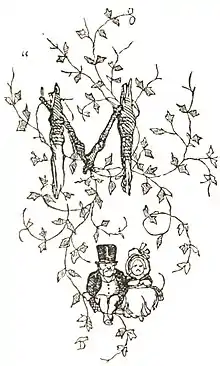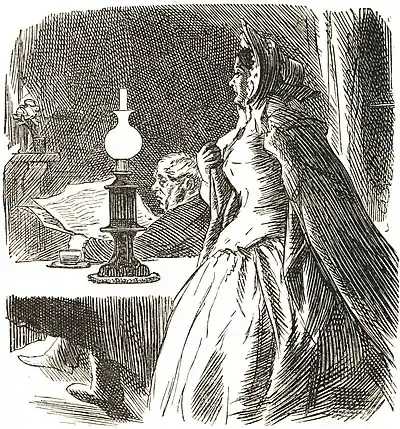LECTURE XXII.

"What's the matter now?
"Well, I like that. Upon my life, Mr. Caudle, that's very cool. I can't leave the house just to buy a yard of riband, but you storm enough to carry the roof off.
"You didn't storm? You only spoke?
"Spoke, indeed! No, sir: I've not such superfine feelings; and I don't cry out before I'm hurt. But you ought to have married a woman of stone, for you feel for nobody: that is, for nobody in your own house. I only wish you'd show some of your humanity at home, if ever so little—that's all.
"What do you say?
"Where's my feelings, to go shopping at night?

WHY CAN'T I GO AT REASONABLE HOURS?
"When would you have me go? In the broiling sun, making my face like a gipsy's? I don't see anything to laugh at, Mr. Caudle; but you think of anybody's face before your wife's. Oh, that's plain enough; and all the world can see it. I dare say, now, if it was Miss Prettyman's face—now, now, Mr. Caudle! What are you throwing yourself about for? I suppose Miss Prettyman isn't so wonderful a person that she isn't to be named? I suppose she's flesh and blood. What?
"You don't know?
"Ha! I don't know that.
"What, Mr. Caudle?
"You'll have a separate room—you'll not be tormented in this manner?
"No, you won't, sir—not while I'm alive. A separate room! And you call yourself a religious man, Mr. Caudle. I'd advise you to take down the Prayer Book, and read over the Marriage Service. A separate room, indeed! Caudle, you're getting quite a heathen. A separate room! Well, the servants would talk then! But no: no man—not the best that ever trod, Caudle—should ever make me look so contemptible.
"I sha'n't go to sleep; and you ought to know me better than to ask me to hold my tongue. Because you come home when I've just stepped out to do a little shopping, you're worse than a fury. I should like to know how many hours I sit up for you? What do you say?
"Nobody wants me to sit up?
"Ha! that's like the gratitude of men—just like 'em! But a poor woman can't leave the house, that—what?
"Why can't I go at reasonable hours?
"Reasonable! What do you call eight o'clock? If I went out at eleven and twelve, as you come home, then you might talk; but seven or eight o'clock—why, it's the cool of the evening; the nicest time to enjoy a walk; and, as I say, do a little bit of shopping. Oh yes, Mr. Caudle, I do think of the people that are kept in the shops just as much as you; but that's nothing at all to do with it. I know what you'd have. You'd have all those young men let away early from the counter to improve what you please to call their minds. Pretty notions you pick up among a set of free-thinkers, and I don't know what! When I was a girl, people never talked of minds—intellect, I believe you call it. Nonsense! a new-fangled thing, just come up; and the sooner it goes out, the better.
 MRS. CAUDLE DOES A "LITTLE SHOPPING." |
"Don't tell me! What are shops for, if they're not to be open late and early too? And what are shopmen, if they're not always to attend upon their customers? People pay for what they have, I suppose, and aren't to be told when they shall come and lay their money out, and when they sha'n't? Thank goodness! if one shop shuts, another keeps open; and I always think it a duty I owe to myself to go to the shop that's open last: it's the only way to punish the shopkeepers that are idle, and give themselves airs about early hours.
"Besides, there's some things I like to buy best at candle-light. Oh, don't talk to me about humanity! Humanity, indeed, for a pack of tall, strapping young fellows—some of 'em big enough to be shown for giants! And what have they to do? Why nothing, but to stand behind a counter, and talk civility. Yes, I know your notions; you say that everybody works too much: I know that. You'd have all the world do nothing half its time but twiddle its thumbs, or walk in the parks, or go to picture-galleries, and museums, and such nonsense. Very fine, indeed; but, thank goodness! the world isn't come to that pass yet.
"What do you say I am, Mr. Caudle?
"A foolish woman, that can't look beyond my own fireside?
"Oh yes, I can; quite as far as you, and a great deal farther. But I can't go out shopping a little with my dear friend Mrs. Wittles—what do you laugh at? Oh, don't they? Don't women know what friendship is? Upon my life, you've a nice opinion of us! Oh yes, we can—we can look outside of our own fenders, Mr. Caudle. And if we can't, it's all the better for our families. A blessed thing it would be for their wives and children if men couldn't either. You wouldn't have lent that five pounds—and I dare say a good many other five pounds that I know nothing of—if you—a lord of the creation!—had half the sense women have. You seldom catch us, I believe, lending five pounds. I should think not.
"No: we won't talk of it to-morrow morning. You're not going to wound my feelings when I come home, and think I'm to say nothing about it. You have called me an inhuman person; you have said I have no thought, no feeling for the health and comfort of my fellow-creatures; I don't know what you haven't called me; and only for buying a—but I sha'n't tell you what; no, I won't satisfy you there-but you've abused me in this manner, and only for shopping up to ten o'clock. You've a great deal of fine compassion, you have! I'm sure the young man that served me could have knocked down an ox; yes, strong enough to lift a house: but you can pity him—oh yes, you can be all kindness for him, and for the world, as you call it. Oh, Caudle, what a hypocrite you are! I only wish the world knew how you treated your poor wife!
"What do you say?
"For the love of mercy let you sleep?
"Mercy, indeed! I wish you could show a little of it to other people. Oh yes, I do know what mercy means; but that's no reason I should go shopping a bit earlier than I do—and I won't. No; you've preached this over to me again and again; you've made me go to meetings to hear about it: but that's no reason women shouldn't shop just as late as they choose. It's all very fine, as I say, for you men to talk to us at meetings, where, of course, we smile and all that—and sometimes shake our white pocket-handkerchiefs—and where you say we have the power of early hours in our own hands. To be sure we have; and we mean to keep it. That is, I do. You'll never catch me shopping till the very last thing; and—as a matter of principle—I'll always go to the shop that keeps open latest. It does the young men good to keep 'em close to business. Improve their minds indeed! Let 'em out at seven, and they'd improve nothing but their billiards. Besides, if they want to improve themselves, can't they get up, this fine weather, at three? Where there's a will, there's a way, Mr. Caudle."
"I thought," writes Caudle, "that she had gone to sleep. In this hope, I was dozing off when she jogged me, and thus declared herself: 'Caudle, you want nightcaps; but see if I budge to buy 'em till nine at night!"